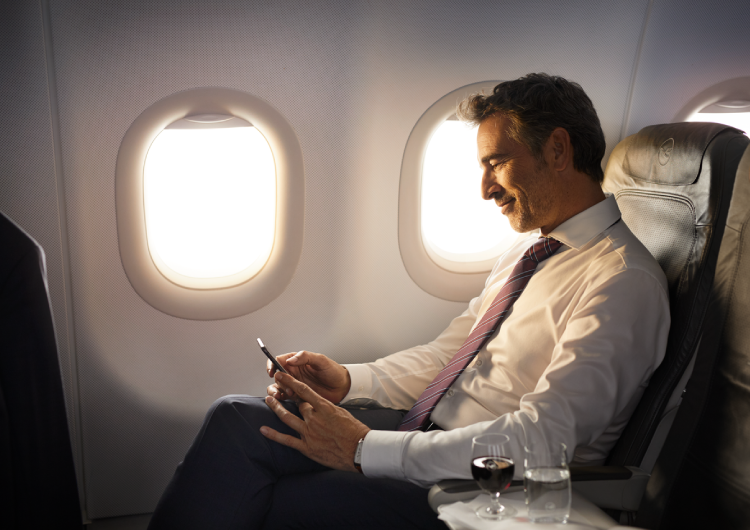Chat with your loved ones at an altitude of 10,000 meters, shop online while travelling or use the company VPN above the clouds without limits: In future, all passengers travelling on European routes will have the reliable option of using Wi-Fi on board. The Lufthansa Group will therefore continue to equip its short and medium-haul aircraft with broadband Internet on three of its airlines this year. The plan is to fully equip all aircraft in the Airbus A220/320 family (A220, A319, A320ceo, A320neo, A321ceo, A321neo) operated by Lufthansa, Austrian Airlines and now also SWISS, in total more than 150 aircraft.
The installation of the system will begin at all airlines from the fourth quarter of 2024 and will be completed after around two years. After Lufthansa, Austrian Airlines and Eurowings, SWISS will thus be the next airline in the Lufthansa Group to introduce in-flight internet for its passengers on short- and medium-haul aircraft. Lufthansa, Austrian Airlines and Eurowings have been offering their passengers broadband internet on many short- and medium-haul flights since 2017.
New is that Lufthansa and Austrian Airlines are now offering their guests unlimited free messaging on aircraft already equipped with internet access. Travellers can send and receive as many messages as they like on their own smartphone or tablet free of charge during the flight. The prerequisite for using this service is logging into FlyNet with a Miles & More service card number or with an e-mail address registered with the Lufthansa Group Travel ID. For all other onboard Internet packages, such as the faster Premium access, now available from just six euros, the price was reduced by almost 50 per cent at the beginning of the year.
The use of the Lufthansa Group Airlines apps and many services in the FlyNet portal of Lufthansa and Austrian Airlines, in the Wings Connect portal of Eurowings and in future also in the SWISS Connect portal are generally free of charge in all Airbus A220/A320 aircraft equipped with broadband Internet. Depending on the airline, guests can follow their flight live on the moving map, for example, receive information on connecting flights, use the chat assistant for service questions, download e-journals, browse the Worldshop or view the onboard menu.
The internet on board is also used by crews in many cases for their daily work, for example to optimize flight routes during the flight. This allows fuel consumption and the corresponding CO2 emissions to be reduced.
The Lufthansa Group commissioned Viasat with the technology and service for equipping more than 150 additional aircraft. The Lufthansa Group has been working with the technology company Inmarsat, which was acquired by Viasat, since 2015. To date, Internet access on more than 200 aircraft in the Lufthansa Group’s A320 family has been based purely on a satellite connection (Ka-band). On the newly equipped aircraft, the internet connection is provided using a hybrid technology called EAN (European Aviation Network). An S-band satellite provides Europe-wide coverage, while supplementary ground components from Deutsche Telekom, terrestrial radio towers with 4G LTE technology, provide additional capacity.
The new technology also represents progress in terms of sustainability in particular: thanks to the much smaller and lighter antennas compared to the technology used previously, the total weight of the system is less than 60 kilograms, thus significantly reducing additional paraffin consumption and CO2 emissions.



